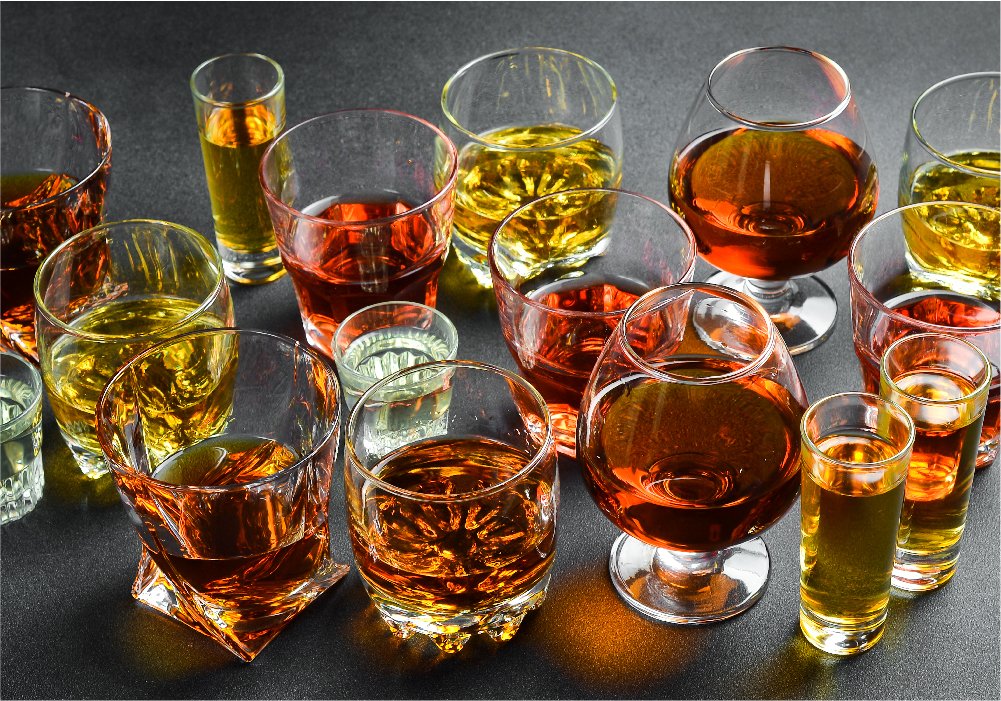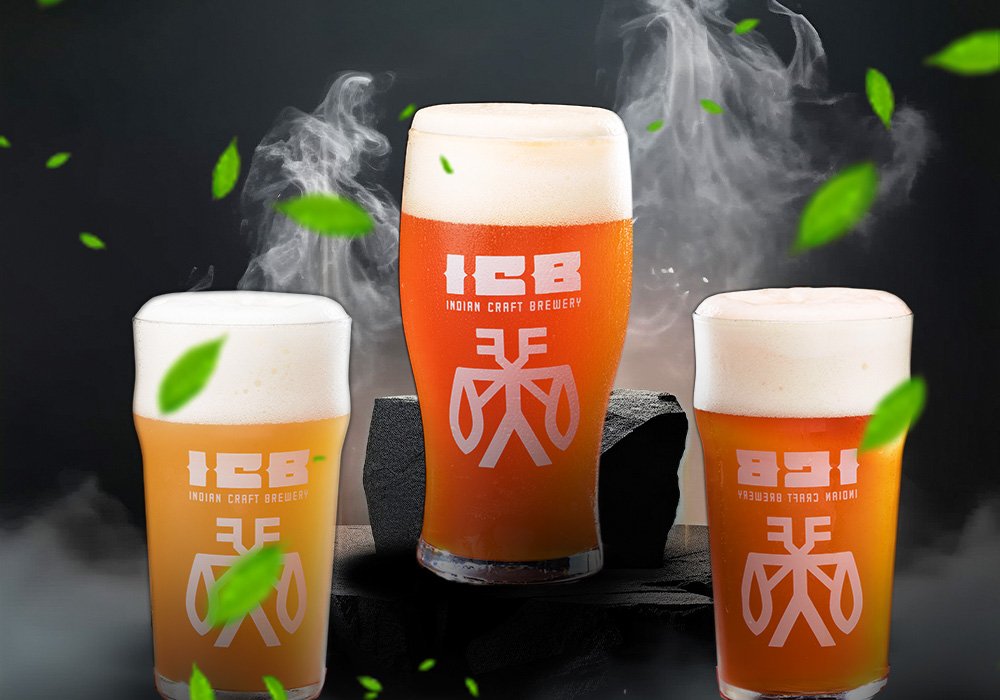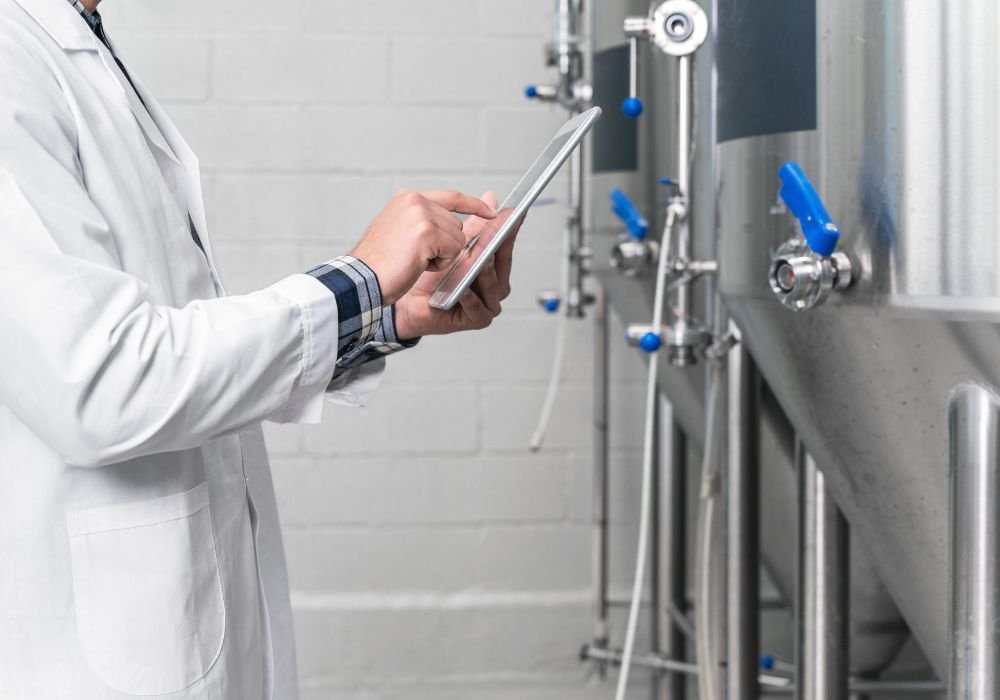
With a total of 4,200 stores being allowed to sell liquor across Karnataka, the state sold close to 43.4 lakh litres of alcohol out of which 7 lakh litres was beer worth Rs 15 crores.
The government’s announcement of the first phase of the nationwide lockdown on March 24th 2020 forced alcohol stores, bars, restaurants and breweries to shut shop immediately. As a result, most people didn’t get the chance to stock up. So naturally, beer-loving consumers were ecstatic over the State Government’s decision to open up MRP after a 40-day gap as they formed serpentine queues more than an hour before the liquor stores raised their shutters.
However, brewers like Bira 91 fear that the government could very well impose restrictions again on liquor retailing in the light of overcrowding and flouting of social distancing norms on the first day of reopening of sale.
[caption id="attachment_14216" align="alignleft" width="332"] A cop warns an inebriated man not to commit nuisance at Majestic Bus Stop, Bangalore. Picture source: BangaloreMirror[/caption]
A cop warns an inebriated man not to commit nuisance at Majestic Bus Stop, Bangalore. Picture source: BangaloreMirror[/caption]
Ankur Jain, founder of Bira 91 hopes that the crowding will ease soon, although he also emphasises that discontinuing liquor sales is not the solution. “There is a definite risk of the government withdrawing its decision, but in our view, that would not be prudent. More disruptions would simply mean that whenever we decide to open, a similar or even worse rush would be there at shops,” he said.
Mumbai Closes Liquor Shops. Again.
[caption id="attachment_14218" align="aligncenter" width="1000"] Large crowds gathered outside liquor shops in Mumbai. Picture by Bennett Coleman and Co. Ltd., Mumbai[/caption]
Large crowds gathered outside liquor shops in Mumbai. Picture by Bennett Coleman and Co. Ltd., Mumbai[/caption]
In Mumbai, however, the Brihanmumbai Municipal Corporation (BMC) has already ordered the closure of liquor and non-essential shops due to people failing to follow protocol for the management of COVID-19. Determined to not allow the virus or the lockdown to separate them from their alcohol anymore, huge crowds thronged to these shops and ignored social distancing norms – leaving even the police machinery in despair.
Mumbai Municipal Commissioner, Praveen Pardeshi, issued an order yesterday saying only “groceries, medical/chemist shops will be allowed to be opened”. The order further notes that “the city has seen a number of positive cases and ‘the down ward trend is yet to set in and gathering of crowds in large numbers without following social distancing will be detrimental to the control of spread of the virus and the advantages of the lockdown will be lost to the gathering of people in large numbers.”
Mumbai is grappling with a rise in the number of Covid-19 cases, Mumbai currently has 9758 cases and 387 deaths. On an average it has been getting more than 400 cases per day.
Tamil Nadu defers opening of liquor stores
[caption id="attachment_14222" align="alignleft" width="400"] A TASMAC store in Tamil Nadu. Picture source: OutlookIndia[/caption]
A TASMAC store in Tamil Nadu. Picture source: OutlookIndia[/caption]
On Monday, Tamil Nadu saw its highest-ever surge in coronavirus cases: 527 new Covid-19 cases on Monday, of which 266 cases were in the capital city Chennai alone. The announcement to open liquor outlets came in the evening, where the Government announced its decision to open state-run liquor outlets (does not include bars) across the state starting May 7th. For this, the Tamil Nadu Government received plenty of flak. Political analyst and senior journalist Dr. Sumanth C Raman told Zee Media: “Liquor brings in about 90crores per day in Tamil Nadu and its been totally shut during the lockdown. The state government has no money and is left with no option. They haven’t received the GST dues from the Central Government, so can the state do away with welfare schemes or hike prices of milk and bus fares and electricity rates? The opposition will lash out at the ruling party for opening liquor shops, but they don’t offer solutions either”.
As of now, state-run TASMAC (Tamil Nadu State Marketing Corporation) liquor outlets falling under Chennai-city Police limits will not open on May 7th and has been deferred until further notice, read a statement from the Tamil Nadu Government. However, those falling outside Chennai in other parts of the state will continue to remain open.On Monday, Tamil Nadu saw its highest-ever surge in coronavirus cases: 527 new Covid-19 cases on Monday, of which 266 cases were in the capital city Chennai alone. The announcement to open liquor outlets came in the evening, where the Government announced its decision to open state-run liquor outlets (does not include bars) across the state starting May 7th. For this, the Tamil Nadu Government received plenty of flak. Political analyst and senior journalist Dr. Sumanth C Raman told Zee Media: “Liquor brings in about 90crores per day in Tamil Nadu and its been totally shut during the lockdown. The state government has no money and is left with no option. They haven’t received the GST dues from the Central Government, so can the state do away with welfare schemes or hike prices of milk and bus fares and electricity rates? The opposition will lash out at the ruling party for opening liquor shops, but they don’t offer solutions either”.
Tamil Nadu has recorded a total of 3550 Covid-19 cases, of which 2107 are active cases. 1438 of the active cases are in the state's capital city Chennai, which has a high population density.
Delhi attempts to kill two birds with one stone with a 70% ‘special corona tax’
[caption id="attachment_14224" align="aligncenter" width="1000"] People violate social distancing norms as they queue up to buy alcohol at Jheel Khurenja in East Delhi. Image Credit: PTI[/caption]
People violate social distancing norms as they queue up to buy alcohol at Jheel Khurenja in East Delhi. Image Credit: PTI[/caption]
The police had to baton-charge hundreds of people when the capital’s liquor shops opened on Monday. The Delhi government responded immediately with a Monday-night order, slapping a whopping 70% tax on the maximum retail price of liquor, effective Tuesday. With alcohol tax being a key contributor to the revenue of pretty much every state in India, the tax would help reduce the impact of the economic disruption caused by the virus while hopefully, deterring large gatherings at stores. They were wrong.
Chaos continued to reign at Delhi’s liquor vends on Tuesday, as several shops did not even open, despite the long queues gathering outside. Inside the Delhi Tourism (DTTDC)-operated liquor shop at Srinivaspuri near Lajpat Nagar, even the person in charge, A.P. Ray, expressed confusion about opening the shop. “We don’t have any list from the government yet on the new rates. We only know that it’s 70 per cent but the new rates have to come to our systems. Without the new rate card, I cannot open the shop,” Ray said. The non-opening of the shop and the police action angered customers, who wanted to know why. Once again, the police had to resort to mild lathi-charge in several areas to disperse crowds.
“It was unfortunate that chaos was seen at some shops today in Delhi....if we come to know about violations of social distancing and other norms from any area, then we will have to seal the area and revoke the relaxations given there,” Delhi Chief Minister, Arvind Kejriwal said. “Shop owners will have to take responsibility and if norms of social distancing are violated outside a shop then the shop will be shut,” he added.
In the national capital, as many as 4,898 people have tested positive for coronavirus. Over one thousand fresh cases were reported in the last few days in Delhi.
Need of the hour: a liberal regime, not price hikes and more restrictions
[caption id="attachment_14230" align="aligncenter" width="1000"] Police officers disperse a crowd flouting social distance outside a government liquor shop in New Delhi on May 4. Photographer: Sonu Mehta/Hindustan Times[/caption]
Police officers disperse a crowd flouting social distance outside a government liquor shop in New Delhi on May 4. Photographer: Sonu Mehta/Hindustan Times[/caption]
The endlessly long queues, people spending hours on the streets, the quarrels, the jostling, the rush to stock up on months’ worth of beer and liquor in spite of the life-threatening COVID-19 situation are clear indicators that India is starved for alcohol. And raising the price of beer and alcohol and imposing more restrictions will only exacerbate the matter.
First, the tax raise issued by the Delhi and now, Andhra Pradesh governments is unfair on the poor who simply cannot afford it. This does not necessarily stop them from drinking. An article from Times of India dated April 15th already revealed that many people were turning to illegal means, where customs and police officials have seen a marked increase in seizures of hooch. For instance, according to an article by Outlook India dated 6th April 2020, two people were caught sneaking out of a TASMAC shop with a haul of liquor bottles in Thiruvallur near Chennai. They had made a hole in one of the walls of the shop using crowbars but villagers assembled and nabbed them following the noise created by the tool. In the same district, four employees of another TASMAC shop opened the shop and were smuggling the bottles when the locals caught them.
Illicit liquor has some serious public health implications and has claimed thousands of lives among the poor in the past. States like Bangalore and Maharashtra that imposed a prohibition on alcohol saw grey market prices soar – along with a parallel nexus forming between people who deal in crime and those who deal in illegally-acquired alcohol.
Second, imposing a 70 percent tax on retail beer and liquor is not a reasonable response to a surge in demand. A large percentage of Indian consumers and Government leaders continue to have an uncomfortable relationship with alcohol as many of them still consider drinking as taboo. This regressive attitude towards alcohol, especially beer, needs to change. If revenue generation is the need of the hour, the government should encourage more shops to engage in the sale of alcohol or maybe even allow online beer delivery (like the Chhattisgarh Government) along with reinforcing social distancing practices and educating both shop owners and consumers on handling alcohol responsibly.
The higher availability of disposable income and a burgeoning urban population has led to skyrocketing demand in beer, craft beer and other liquor. If there was ever a time for the government to recognise this demand and take an initiative to reform alcohol policies and liberalise sales – now would be it.
References:














